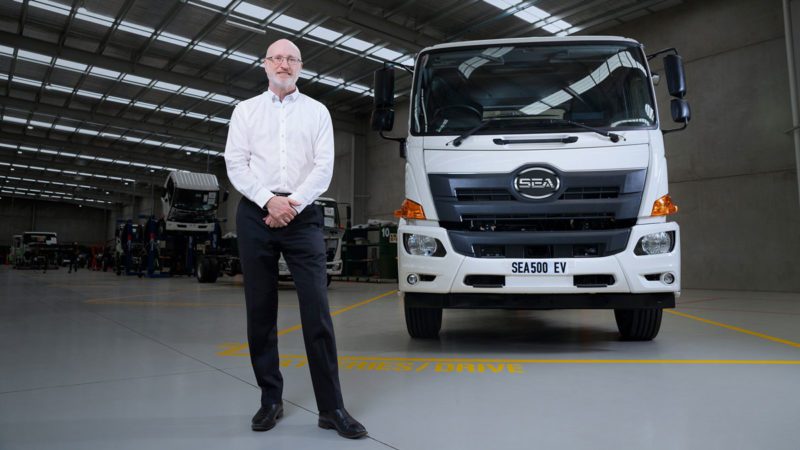SEA Electric has announced the launch of volume production of its first locally-assembled electric trucks, the SEA 300 and SEA 500.
In an announcement on Wednesday, the Melbourne-based electric truck company outlined the range of specifications for the trucks which are the first it is manufacturing from a base “knock-down” kit.
Previously, the eight-year old company has constructed electric trucks for custom applications for customers both in Australia and overseas by retrofitting its patented electric SEA drivetrain to diesel trucks.
Now, it is making the SEA-branded SEA 300 and SEA 500 (which are based on the Hino 300 and 500 series) from new using Hino SKD (Semi Knocked Down) kits, and will sell them through 15 dealerships throughout Australia.
“SEA Electric is privileged to be able to bring this Australian first to the marketplace,” said Glen Walker, SEA Electric regional director for Oceania in a statement.
“It represents an exciting phase in global EV development, and this places SEA Electric at the forefront.”
The SEA electric truck range is available in a variety of specifications with a maximum 280kWh battery capacity. This is available on the SEA 500-225 which offers a 6×2 axle configuration, maximum length of 9.24 metres and gross mass of 22.5 tonnes.
Driving range also varies depending on configurations but starts at 200km to a top of 300km, unladen, depending on which drivetrain is fitted.
While pricing will be determined by configuration options and application, a Walker said in a note by email to The Driven that expected payback time is four to five years thanks to the lower cost of ownership.
He also says that SEA Electric has already taken 46 orders for its SEA 300 and SEA 500, which can be customised to fit a range of applications including tippers, garbage trucks, cherry pickers and more.

Being electric, they offer a range of benefits for employers and drivers, including quiet operation, no smelly fumes and of course, zero tailpipe carbon emissions or other pollutants typical of diesel trucks such as nitrous oxide and methane.
“In Australia, carbon dioxide emissions from transport are now the second highest behind electricity generation, and are forecast to continue rising,” said Walker.
“With this announcement, the freight industry can now react – safe in the knowledge that their freight product offering will be enhanced in their clients’ eyes.
“Mass uptake of electric trucks in urban Australia has the potential to save up to millions of tonnes of CO2 each year, and provide up to 40,000 MWh of mobile battery storage, which is a potential future revenue stream,” he said.
Walker notes that the above benefits plus reduced vibrations which combine to decrease driver fatigue equal improved workplace health and safety conditions.
“SEA-Drive® technology performs exceptionally well in congested urban environments, where pollution reduction is needed most, and as demonstrated by real world experience from our global vehicle deployments it provides competitive whole of life operating costs when compared to traditional diesel vehicles,” he said.
To ensure the trucks are future-proofed, SEA Electric says it is using an upgradable plug-and-play architecture. In its current format, it can charge on a 415-volt 3 phase set up at a cost of about $14 a day (based on off-peak electricity prices of 15c/kWh).
Walker adds that, “There are a range of advantages provided by the SEA-Drive® Power-System, including reduced service costs, with a routine four-hour inspection required every six months, and minimal wear on service brakes due to the use of regenerative braking.”
The trucks can be ordered from 15 SEA Electric dealers nationwide that also provide service and parts support, including any work carried out under the standard three-year warranty. An SEA 280 will also be announced shortly.
“Having a strong dealer network and nationwide support structure in place, we are excited for the range to hit Australia’s roads,” Walker said.
This article has been updated with information about pricing and cost of ownership.

Bridie Schmidt is associate editor for The Driven, sister site of Renew Economy. She has been writing about electric vehicles since 2018, and has a keen interest in the role that zero-emissions transport has to play in sustainability. She has participated in podcasts such as Download This Show with Marc Fennell and Shirtloads of Science with Karl Kruszelnicki and is co-organiser of the Northern Rivers Electric Vehicle Forum. Bridie also owns a Tesla Model Y and has it available for hire on evee.com.au.

